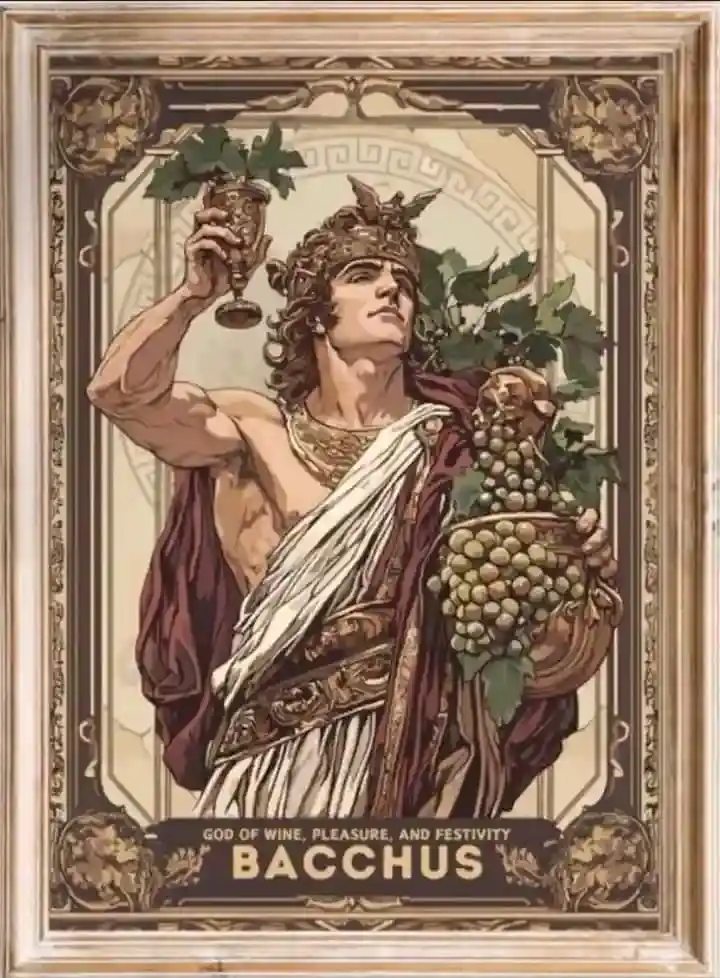
TMB ART & MYTHICAL WORLD
February 12, 2025 at 08:01 AM
BACCHUS
Bacchus, the Roman god of wine, revelry, fertility, and ecstasy, is the counterpart to the Greek god Dionysus. Known for his indulgence in the pleasures of life, Bacchus represents both the joyful abandon of intoxication and the darker, more chaotic forces of excess. His influence extends beyond just wine—he governs the ecstatic freedom of the human spirit, often leading his followers into ecstatic frenzy and uninhibited behavior.
Bacchus is the son of the god Jupiter (Zeus) and the mortal Semele, a princess of Thebes. His birth is one of the most dramatic in mythology. According to the myth, Semele was tricked by the jealous goddess Hera into asking Jupiter to reveal his true form to her. When Jupiter did so, his divine radiance consumed her, and she died. However, Bacchus was miraculously saved by Jupiter, who sewed him into his own thigh until he was ready to be born. Bacchus’ miraculous birth and divine parentage are central to his identity as both a god and a symbol of life’s unpredictability.
Bacchus is most famous for his role as the god of wine, and his powers are intrinsically tied to the vine, intoxication, and celebration. Wine was considered a gift from the gods, and Bacchus was believed to be the one who taught humans how to cultivate grapes and brew wine. His followers, known as Maenads (wild female devotees) and Satyrs (half-man, half-goat creatures), would often partake in ecstatic rituals of music, dancing, and drinking, sometimes even in the wilds of nature. These celebrations, known as the Bacchanalia, were originally held in his honor and were marked by freedom, chaos, and uncontrollable joy.
Bacchus is typically depicted as a youthful, handsome god holding a wine cup or a thyrsus (a staff entwined with ivy and topped with a pinecone), symbols of his dominion over intoxication and the harvest. His crown is often made of grapevines or ivy, reflecting his connection to both fertility and the wine harvest. He is also frequently shown in the company of his followers, Maenads and Satyrs, who embody the free-spirited, wild nature of his cult.
The Bacchanalia were once secret, night-time rituals where devotees would engage in wild revelries, dancing, and drinking, often to the point of frenzy. In some cases, these rituals involved ritualistic sacrifice and were considered deeply transgressive. The cult of Bacchus was so powerful and its celebrations so uninhibited that, at one point, the Roman Senate attempted to ban the Bacchanalia, fearing their potential for subversion and disorder. Despite this, Bacchus’ popularity continued to spread, especially among the lower classes and soldiers, who found comfort in the ecstatic release of the rituals.
Like his Greek counterpart, Bacchus was also associated with the concept of transformation. He could transform both individuals and himself, turning mortals into animals or vines, and transforming his followers’ everyday lives into states of ecstasy. This ability to cause metamorphosis reflects his role in the wild, untamed aspects of nature. His power to make people lose themselves in drunkenness or madness also symbolizes the human desire to escape reality, break free from constraints, and experience a heightened sense of freedom.
In art, Bacchus is often depicted as a symbol of both pleasure and excess, embracing freedom from social order and authority. He was a popular figure in Roman poetry and art, where he appeared as a god of not just wine, but also of joy, theater, and emotional release. He was also frequently shown in works of Renaissance art, where artists explored the tensions between indulgence and excess.
Bacchus’ legacy as a god of pleasure, freedom, and transformation is a reminder of both the joys and dangers of excess. His character embodies the tension between ecstasy and chaos, reflecting the timeless appeal of abandoning societal norms for brief moments of liberation. Bacchus continues to be a symbol in modern culture for indulgence, celebration, and the darker side of freedom.

❤️
1